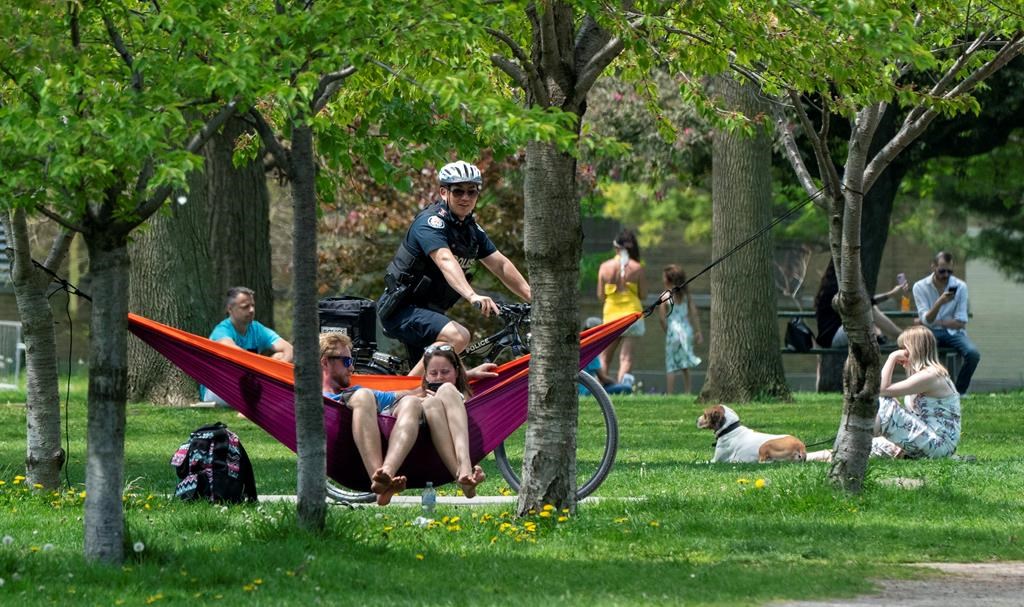As Canadians head into the Victoria Day long weekend, there are concerns that social gatherings could cause a spike in COVID-19 cases in the country.

“The long weekend is going to be a challenge across the country,” Donald Vinh, an infectious diseases specialist and a medical microbiologist at the McGill University Health Centre, said.
With pandemic fatigue, good weather and less than half of the population vaccinated with one dose, a “perfect storm” is brewing, Vinh told Global News.
Canada’s deputy chief public health officer, Howard Njoo, also warned Canadians of “a post-holiday spike.”
“COVID-19 resurgences have followed social gatherings during past holidays and long weekends,” he said during a news conference on Friday.
Canada has “seen increases about six to 10 days after almost all social events,” Timothy Sly, an epidemiologist and professor emeritus at Ryerson University’s School of Public Health, said in an email interview with Global News.
He said “on that basis alone, we should be prepared” for a surge in COVID-19 infections.

Sly said, though, that all of the previous holidays amid the pandemic have been “unaccompanied by the present increase in neutralizing antibodies in the population, due in major part to the vaccination campaign.”
Gerald Evans, an infectious disease specialist at Queen’s University in Kingston, Ont., said even if a surge occurs it would be small given the higher vaccination numbers.
As of Friday afternoon, Canada had administered over 20 million COVID-19 vaccines, according to COVID Tracker Canada. That means approximately 48.8 per cent of the Canadian population has received a single dose. However, only four per cent of the population has received both shots.
However, Sly said there is “growing evidence” that the first shot is “by far the most important.”
He pointed to comments made by British Columbia’s provincial health officer, Dr. Bonnie Henry, last week.
Henry shared modelling showing 98 per cent of new diagnoses of COVID-19 were among people who had not yet received a vaccine.
Only 1.7 per cent of the cases reported in the province were found in those who had received a single COVID-19 shot, while 0.2 per cent of the cases were reported in people who had been given both doses.
But regardless of your vaccination status, Njoo said people should continue to follow their local public health guidelines.

Celebrating safely
This week, several provinces announced their reopening plans as daily infections continue to drop.
In the most populous province, Ontario, starting Saturday, residents will be permitted to use outdoor recreational facilities under restrictions. A current stay-at-home order, along with its more than two dozen reasons for leaving home, remains in effect until June 2.
Meanwhile, Manitoba announced Thursday new COVID-19 restrictions ahead of the long weekend, which include limiting outdoor gatherings to only people from the same household.
Njoo on Friday urged Canadians not to let their guard down this weekend.
“Our actions this long weekend could not be more important,” he said, advising people to spend more time outdoors and choose low-risk activities, such as family hikes on trails, walks around the neighbourhood or barbecues in the backyard.

Vinh agreed, saying outdoor activities have a lower risk of COVID-19 transmission.
However, even outside, Sly said Canadians should “avoid close encounters with others.”
“Group hugs are right out,” he said. “Soccer scrums, too.”
He said while organized sports may seem “distanced on the field,” the “changing room (or) clubhouse before and after is wide open for trouble.”
“Dragging a mob to the beach with bonfire and beer after dark is insane, especially as the age group may not have seen any vaccine yet,” he added.
Further, Sly said elderly, frail, ill people, or those who are otherwise immunocompromised, must be protected and remain distanced “in any case because they may not be fully immunized.”
“We have seen time after time, at a low level, we cast off the protection and start yet another wave,” he said, pointing to India’s recent devastating spike as an example.
“We must prevent another wave.”
Evans said people can celebrate in small groups, preferably ones that are within your household or “bubble”.
What happened last May long weekend?
From May 23 to May 25, 2020, a total of 2,090 new cases of the coronavirus were detected across Canada.
On the holiday Monday — May 25, 2020 — the county’s total case count stood at 84,699.
In the two weeks leading up to May 25, from May 11 to May 25, a total of 15,730 new cases were reported.
However, in the two weeks following the long weekend, between May 25 and June 8, only 10,533 new infections were detected.
But, 10 days later, on June 18, the country hit a grim milestone as the country’s total case count topped 100,000.
Vinh said the next few weeks as provinces start to lift restrictions will be important.
“Even though the data is optimistic right now, pretty much across Canada, we’re not out of the woods yet,” he said.
“That light at the end of the tunnel is encouraging, but we don’t want to trip up along the way and find that it was a train coming.”
- Canadian man dies during Texas Ironman event. His widow wants answers as to why
- ‘Sciatica was gone’: hospital performs robot-assisted spinal surgery in Canadian first
- Canadians more likely to eat food past best-before date. What are the risks?
- Treatment from female doctors leads to lower death rates, study finds






Comments